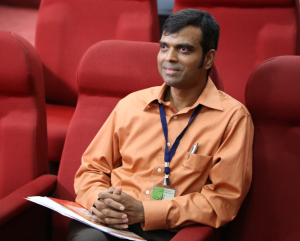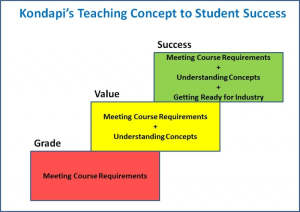Dr. Phaneendra Kondapi is well-known at the UH Cullen College of Engineering as one of the pioneering instructors of subsea engineering. Now, he is being recognized outside of the college for his fantastic contributions as a subsea engineering instructor.
Kondapi was awarded the 2013 SPE Teaching Excellence Award from the Society of Petroleum Engineers (SPE) International. The purpose of this award, according to SPE International, is to recognize petroleum engineering faculty who have demonstrated innovative teaching techniques and creative pedagogy methods and to encourage faculty to excel in the classroom, provide teaching best practices to be shared with other departments, and develop and retain superior faculty. As part of the award, Kondapi was invited to attend the International Faculty Session at the 2013 SPE Annual Technical Conference and Exhibition in New Orleans to give a short presentation explaining his innovative teaching ideas.
“This is a world-recognized award from the SPE, and to have one of our initial professors in the subsea program win this award is not only a fantastic honor for Dr. Kondapi, but for the whole subsea program,” said Matt Franchek, director of the subsea engineering program and professor of mechanical engineering at the Cullen College.
A very popular professor with UH students, Kondapi is widely-recognized inside and outside of the university for his ability to instill a sense of enthusiasm in his students. “I want to infuse my students not just with the subject matter, but with enthusiasm for the subject and course. My motivation is to make my students successful by encouraging them to get ready for industry,” Kondapi explained with a passion.
To this end, Kondapi developed his own way of teaching complicated engineering theories to students based on a three-step process for student success, which he calls the “reverse circular teaching method.” With this method, Kondapi emphasizes that simply teaching theories to students is not enough. “We have an obligation to our students to connect-the-dots between theories and the real-world application of those theories,” Kondapi said.
In this method, Kondapi begins each class with a project which asks students to solve a real-world problem – “not just a theoretical problem, a real problem we are working on in industry.” Only after being assigned their big project will Kondapi start in on the theories. “It motivates them to acquire the ideas and solution strategies necessary to figure it out, so that way they have to relate the theories back to the project – we connect-the-dots between an equation on a chalkboard and what they will be doing every day when they go to work in industry.”
And Kondapi is certainly in a position to help make those connections for students. In addition to serving as a KBR Adjunct Professor in the mechanical engineering department at the Cullen College, Kondapi is an engineering manager for flow management at FMC Technologies. Having a foot in both academia and industry, Kondapi said, provides him with a certain edge when it comes to connecting-the-dots for engineering students.
For one thing, Kondapi regularly experiences engineers fresh out of graduate school coming into the industry without the specific skills industry needs at that time. To help address this knowledge gap, Kondapi regularly invites fellow industry experts into his classes to lecture, answer questions, and give Cullen College students a bit more insight into the needs and expectations of industry.
“When I was in graduate school I couldn’t relate what I was learning in class to how to apply it to industry,” Kondapi explained. “Based on that experience, I can understand the students and what they need from me as an educator preparing them for the next chapter in their lives.”
Kondapi said he prepares students for the “real world” in four ways: inviting industry speakers into the classroom, taking students on flow assurance lab field trips, and asking students to prepare professional project reports and to give presentations in front of industry professionals. Kondapi noted that “this may be the first three-credit-hour university-level course in the U.S. that has been designed to meet direct subsea applications with academic standards.”
According to Kiran Harikrishna, a student from Kondapi’s inaugural class in 2011, these methods of “connecting-the-dots” between theory and application paid off immensely. “The standard of education was excellent and I personally think that it is invaluable, providing [students] not simply with a 36,000-ft view of subsea system, but actually training all of us to be able to understand, solve and work on real life problems, thus making us better trained and more knowledgeable engineers” said Harikrishna.
In addition to being a pioneer in subsea education and higher-learning teaching methods, Kondapi was instrumental in getting the subsea engineering program started at UH. Kondapi started teaching the inaugural course, Flow Assurance, of the Subsea Program in Spring 2011, and has been trailblazing efforts to standardize subsea education and establish a global subsea education alliance ever since.
Last May, Kondapi attended the Offshore Technology Conference (OTC), where he delivered a presentation and urged for the creation of a National Institute for Subsea Engineering (NISE) with the goal of standardizing the discipline. Kondapi was also highlighted in a publication from the OTC for his presentation on state-of-the-art flow assurance technologies at the conference. In the presentation, Kondapi reviewed thirty different existing flow assurance technologies, summarizing the current state of technology based on maturity level, solution type, applicability and effectiveness.
These accomplishments in both research and industry are all more impressive when you consider Kondapi’s steadfast commitment to educating his students and preparing them for working life after college – a commitment which oftentimes keeps him at the university until late-night working with his students.
“At the end of the day,” Kondapi said, “it’s not just the grade, it’s not even just understanding concepts, it’s all about how to apply these concepts to industry, to the real world problems. That is what matters. That’s what makes students successful. When a student says that he or she got value out of the course and it was worth the time, it gives me an immense satisfaction. What else do you expect as a teacher?”
Sincerely thanking SPE for this prestigious award, Kondapi said with a smile, “I am very lucky to get this award from a pool of teaching experts around the globe. In fact, this award is truly an honor for the University of Houston and FMC Technologies. It certainly belongs to them for their constant support and encouragement.”

